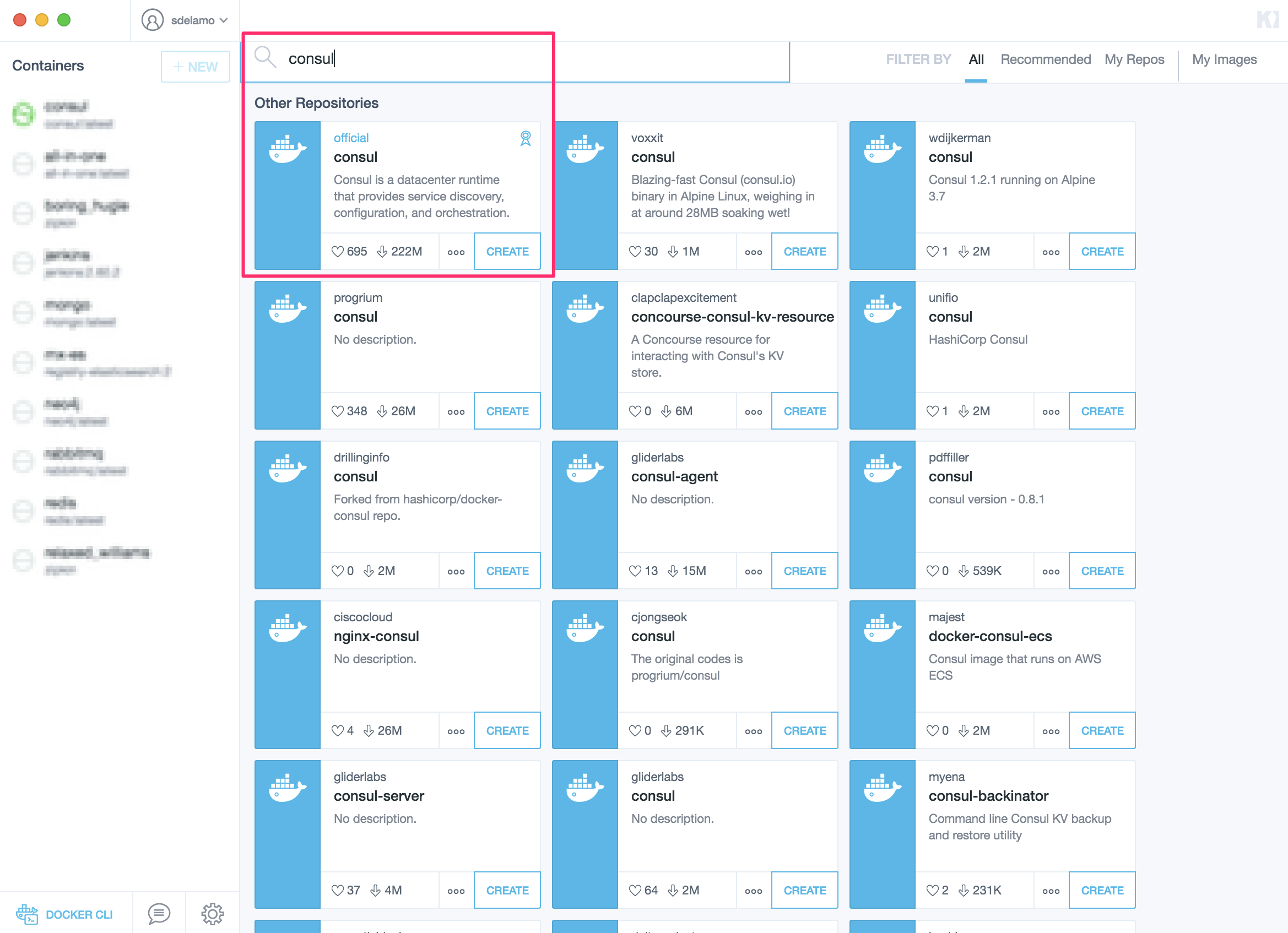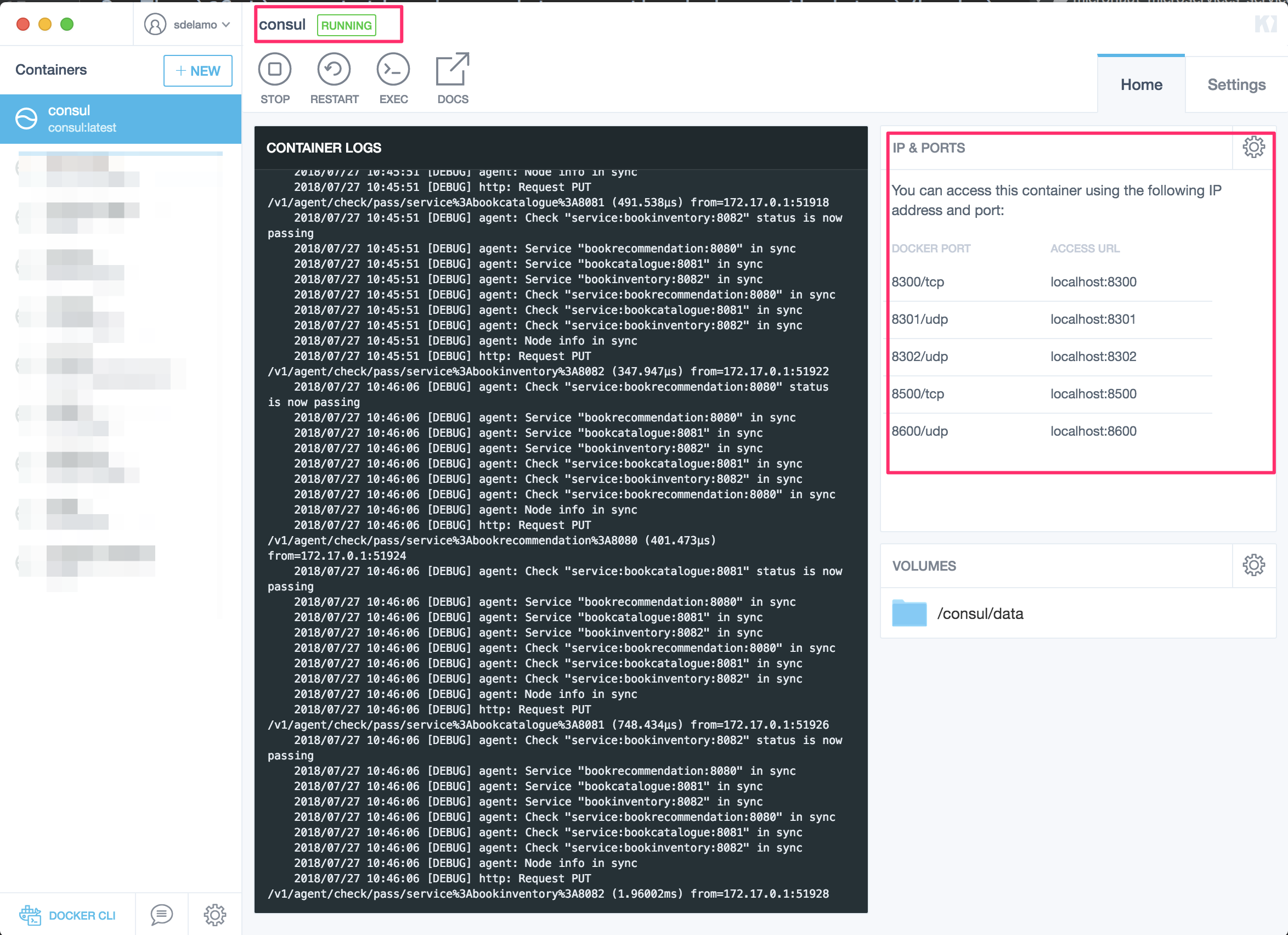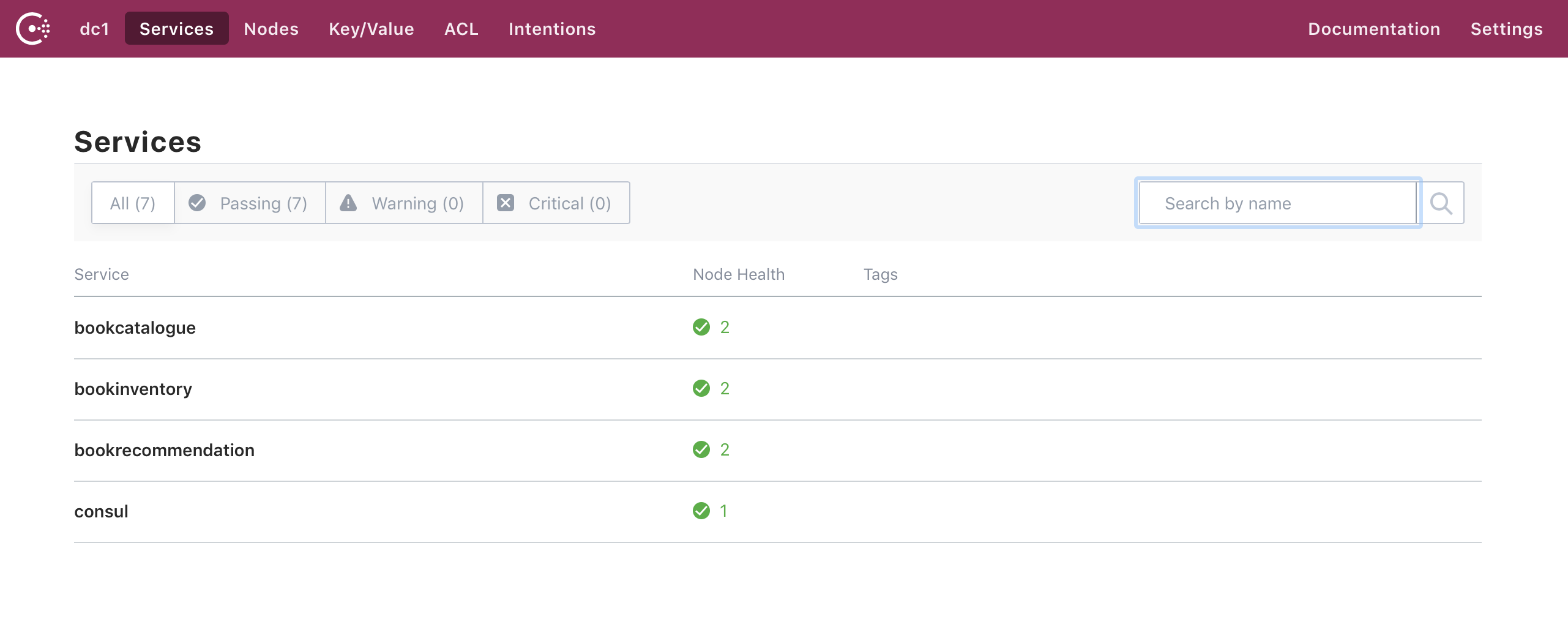Consul and the Micronaut Framework - Microservices Service Discovery
Use Consul service discovery to expose your Micronaut applications.
Authors: Sergio del Amo
Micronaut Version: 4.10.7
1. Getting Started
In this guide, we will create three microservices and register them with Consul Service discovery.
Consul is a distributed service mesh to connect, secure, and configure services across any runtime platform and public or private cloud
You will discover how the Micronaut framework eases Consul integration.
2. What you will need
To complete this guide, you will need the following:
-
Some time on your hands
-
A decent text editor or IDE (e.g. IntelliJ IDEA)
-
JDK 21 or greater installed with
JAVA_HOMEconfigured appropriately
3. Solution
We recommend that you follow the instructions in the next sections and create the application step by step. However, you can go right to the completed example.
-
Download and unzip the source
4. Writing the App
Let’s describe the microservices you will build through the guide.
-
bookcatalogue- It returns a list of books. It uses a domain consisting of a book name and ISBN. -
bookinventory- It exposes an endpoint to check whether a book has sufficient stock to fulfil an order. It uses a domain consisting of a stock level and ISBN. -
bookrecommendation- It consumes previous services and exposes an endpoint which recommends book names which are in stock.
Initially we will hard-code the addresses where the different services are in the bookcatalogue service.
As shown in the previous image, the bookcatalogue hardcodes references to its collaborators.
In the second part of this guide we will use a discovery service.
|
About registration patterns We will use a self‑registration pattern. Thus, each service instance is responsible for registering and deregistering itself with the service registry. Also, if required, a service instance sends heartbeat requests to prevent its registration from expiring. |
Services register when they start up:
We will use client‑side service discovery, clients query the service registry, select an available instance, and make a request.
4.1. Catalogue Microservice
Create the bookcatalogue microservice using the Micronaut Command Line Interface or with Micronaut Launch.
mn create-app --features=discovery-consul,management,graalvm example.micronaut.bookcatalogue --build=gradle --lang=groovy
If you don’t specify the --build argument, Gradle with the Kotlin DSL is used as the build tool. If you don’t specify the --lang argument, Java is used as the language.If you don’t specify the --test argument, JUnit is used for Java and Kotlin, and Spock is used for Groovy.
|
If you use Micronaut Launch, select Micronaut Application as application type and add the discovery-consul, management, and graalvm features.
The previous command creates a directory named bookcatalogue and a Micronaut application inside it with default package example.micronaut.
| If you have an existing Micronaut application and want to add the functionality described here, you can view the dependency and configuration changes from the specified features, and apply those changes to your application. |
Create a BooksController class to handle incoming HTTP requests into the bookcatalogue microservice:
package example.micronaut
import groovy.transform.CompileStatic
import io.micronaut.http.annotation.Controller
import io.micronaut.http.annotation.Get
@CompileStatic
@Controller("/books") (1)
class BooksController {
@Get (2)
List<Book> index() {
[
new Book("1491950358", "Building Microservices"),
new Book("1680502395", "Release It!"),
new Book("0321601912", "Continuous Delivery:")
]
}
}| 1 | The class is defined as a controller with the @Controller annotation mapped to the path /. |
| 2 | The @Get annotation maps the index method to an HTTP GET request on /books. |
The previous controller responds a List<Book>. Create the Book POJO:
package example.micronaut
import groovy.transform.CompileStatic
import groovy.transform.EqualsAndHashCode
import io.micronaut.core.annotation.Creator
import io.micronaut.core.annotation.NonNull
import io.micronaut.serde.annotation.Serdeable
import jakarta.validation.constraints.NotBlank
@CompileStatic
@EqualsAndHashCode
@Serdeable
class Book {
@NonNull
@NotBlank
final String isbn
@NonNull
@NotBlank
final String name
@Creator
Book(@NonNull @NotBlank String isbn,
@NonNull @NotBlank String name) {
this.isbn = isbn
this.name = name
}
}Write a test:
package example.micronaut
import io.micronaut.core.type.Argument
import io.micronaut.http.HttpRequest
import io.micronaut.http.client.HttpClient
import io.micronaut.http.client.annotation.Client
import io.micronaut.test.extensions.spock.annotation.MicronautTest
import jakarta.inject.Inject
import spock.lang.Specification
@MicronautTest (1)
class BooksControllerSpec extends Specification {
@Inject
@Client("/")
HttpClient client (2)
void "it is possible to retrieve books"() {
when:
HttpRequest request = HttpRequest.GET("/books") (3)
List<Book> books = client.toBlocking().retrieve(request, Argument.listOf(Book)) (4)
then:
books.size() == 3
books.contains(new Book("1491950358", "Building Microservices"))
books.contains(new Book("1680502395", "Release It!"))
}
}| 1 | Annotate the class with @MicronautTest so the Micronaut framework will initialize the application context and the embedded server. More info. |
| 2 | Inject the HttpClient bean and point it to the embedded server. |
| 3 | Creating HTTP Requests is easy thanks to the Micronaut framework fluid API. |
| 4 | Parse easily JSON into Java objects. |
Edit application.properties
(1)
micronaut.application.name=bookcatalogue| 1 | Configure the application name. The application name will be used by the discovery service. |
Modify the Application class to use dev as a default environment:
The Micronaut framework supports the concept of one or many default environments. A default environment is one that is only applied if no other environments are explicitly specified or deduced.
package example.micronaut
import groovy.transform.CompileStatic
import io.micronaut.runtime.Micronaut
import static io.micronaut.context.env.Environment.DEVELOPMENT
@CompileStatic
class Application {
static void main(String[] args) {
Micronaut.build(args)
.mainClass(Application)
.defaultEnvironments(DEVELOPMENT)
.start()
}
}Create src/main/resources/application-dev.properties. The Micronaut framework applies this configuration file only for the dev environment.
(1)
micronaut.server.port=8081| 1 | Configure the application to listen on port 8081 |
Create a file named application-test.properties which is used in the test environment:
consul.client.registration.enabled=falseRun the unit test:
./gradlew test4.2. Inventory Microservice
Create the bookinventory microservice using the Micronaut Command Line Interface or with Micronaut Launch.
mn create-app --features=discovery-consul,management,graalvm example.micronaut.bookinventory --build=gradle --lang=groovy
If you don’t specify the --build argument, Gradle with the Kotlin DSL is used as the build tool. If you don’t specify the --lang argument, Java is used as the language.If you don’t specify the --test argument, JUnit is used for Java and Kotlin, and Spock is used for Groovy.
|
If you use Micronaut Launch, select Micronaut Application as application type and add the discovery-consul, management, and graalvm features.
The previous command creates a directory named bookinventory and a Micronaut application inside it with default package example.micronaut.
| If you have an existing Micronaut application and want to add the functionality described here, you can view the dependency and configuration changes from the specified features, and apply those changes to your application. |
Create a Controller:
package example.micronaut
import groovy.transform.CompileStatic
import io.micronaut.http.annotation.Controller
import io.micronaut.http.annotation.Get
import io.micronaut.http.annotation.Produces
import jakarta.validation.constraints.NotBlank
import static io.micronaut.http.MediaType.TEXT_PLAIN
@CompileStatic
@Controller("/books") (1)
class BooksController {
@Produces(TEXT_PLAIN) (2)
@Get("/stock/{isbn}") (3)
Boolean stock(@NotBlank String isbn) {
bookInventoryByIsbn(isbn).map(bi -> bi.stock > 0).orElse(null)
}
private Optional<BookInventory> bookInventoryByIsbn(String isbn) {
if (isbn == "1491950358") {
return Optional.of(new BookInventory(isbn, 4))
}
if (isbn == "1680502395") {
return Optional.of(new BookInventory(isbn, 0))
}
Optional.empty()
}
}| 1 | The class is defined as a controller with the @Controller annotation mapped to the path /books. |
| 2 | By default, Content-Type of a controller response is application/json : override this with text/plain since we are returning a String, not a JSON object. |
| 3 | The @Get annotation maps the index method to an HTTP GET request on /books/stock/{isbn}. |
Create the POJO used by the controller:
package example.micronaut
import groovy.transform.CompileStatic
import groovy.transform.EqualsAndHashCode
import io.micronaut.core.annotation.NonNull
import io.micronaut.serde.annotation.Serdeable
import jakarta.validation.constraints.NotBlank
@CompileStatic
@EqualsAndHashCode
@Serdeable
class BookInventory {
@NonNull
@NotBlank
final String isbn
final int stock
BookInventory(@NonNull @NotBlank String isbn,
int stock) {
this.isbn = isbn
this.stock = stock
}
}Write a test:
package example.micronaut
import io.micronaut.http.HttpRequest
import io.micronaut.http.HttpResponse
import io.micronaut.http.client.HttpClient
import io.micronaut.http.client.annotation.Client
import io.micronaut.http.client.exceptions.HttpClientResponseException
import io.micronaut.test.extensions.spock.annotation.MicronautTest
import jakarta.inject.Inject
import spock.lang.Specification
import static io.micronaut.http.HttpStatus.NOT_FOUND
import static io.micronaut.http.HttpStatus.OK
@MicronautTest
class BooksControllerSpec extends Specification {
@Inject
@Client("/")
HttpClient httpClient
void "for a book with inventory true is returned"() {
when:
HttpResponse<Boolean> rsp = httpClient.toBlocking().exchange(
HttpRequest.GET("/books/stock/1491950358"), Boolean)
then:
rsp.status() == OK
rsp.body()
}
void "for an invalid ISBN 404 is returned"() {
when:
httpClient.toBlocking().exchange(HttpRequest.GET("/books/stock/XXXXX"), Boolean)
then:
HttpClientResponseException e = thrown()
e.response.status == NOT_FOUND
}
}Edit application.properties
(1)
micronaut.application.name=bookinventory| 1 | Configure the application name. The name will be used later in the guide. |
Modify the Application class to use dev as a default environment:
The Micronaut framework supports the concept of one or many default environments. A default environment is one that is only applied if no other environments are explicitly specified or deduced.
package example.micronaut
import groovy.transform.CompileStatic
import io.micronaut.runtime.Micronaut
import static io.micronaut.context.env.Environment.DEVELOPMENT
@CompileStatic
class Application {
static void main(String[] args) {
Micronaut.build(args)
.mainClass(Application)
.defaultEnvironments(DEVELOPMENT)
.start()
}
}Create src/main/resources/application-dev.properties. The Micronaut framework applies this configuration file only for the dev environment.
(1)
micronaut.server.port=8082| 1 | Configure the application to listen on port 8082 |
Create a file named application-test.properties which is used in the test environment:
consul.client.registration.enabled=falseRun the unit test:
./gradlew test4.3. Recommendation Microservice
Create the bookrecommendation microservice using the Micronaut Command Line Interface or with Micronaut Launch.
mn create-app --features=discovery-consul,management,reactor,graalvm example.micronaut.bookrecommendation --build=gradle --lang=groovy
If you don’t specify the --build argument, Gradle with the Kotlin DSL is used as the build tool. If you don’t specify the --lang argument, Java is used as the language.If you don’t specify the --test argument, JUnit is used for Java and Kotlin, and Spock is used for Groovy.
|
If you use Micronaut Launch, select Micronaut Application as application type and add the discovery-consul, management, reactor, and graalvm features.
The previous command creates a directory named bookrecommendation and a Micronaut application inside it with default package example.micronaut.
| If you have an existing Micronaut application and want to add the functionality described here, you can view the dependency and configuration changes from the specified features, and apply those changes to your application. |
Create an interface to map operations with bookcatalogue, and a Micronaut Declarative HTTP Client to consume it.
package example.micronaut
import org.reactivestreams.Publisher
interface BookCatalogueOperations {
Publisher<Book> findAll()
}package example.micronaut
import io.micronaut.http.annotation.Get
import io.micronaut.http.client.annotation.Client
import io.micronaut.retry.annotation.Recoverable
import org.reactivestreams.Publisher
@Client("http://localhost:8081") (1)
@Recoverable(api = BookCatalogueOperations)
interface BookCatalogueClient extends BookCatalogueOperations {
@Get("/books")
Publisher<Book> findAll()
}| 1 | Use @Client to use declarative HTTP Clients. You can annotate interfaces or abstract classes. You can use the id member to provide a service identifier or specify the URL directly as the annotation’s value. |
The client returns a POJO. Create it in the bookrecommendation:
package example.micronaut
import groovy.transform.CompileStatic
import groovy.transform.EqualsAndHashCode
import io.micronaut.core.annotation.NonNull
import io.micronaut.serde.annotation.Serdeable
import jakarta.validation.constraints.NotBlank
@CompileStatic
@EqualsAndHashCode
@Serdeable
class Book {
@NonNull
@NotBlank
final String isbn
@NonNull
@NotBlank
final String name
Book(@NonNull @NotBlank String isbn,
@NonNull @NotBlank String name) {
this.isbn = isbn
this.name = name
}
}Create an interface to map operations with bookinventory, and a Micronaut Declarative HTTP Client to consume it.
package example.micronaut
import io.micronaut.core.annotation.NonNull
import reactor.core.publisher.Mono
import jakarta.validation.constraints.NotBlank
interface BookInventoryOperations {
Mono<Boolean> stock(@NonNull @NotBlank String isbn)
}package example.micronaut
import io.micronaut.core.annotation.NonNull
import io.micronaut.http.annotation.Consumes
import io.micronaut.http.annotation.Get
import io.micronaut.http.client.annotation.Client
import io.micronaut.retry.annotation.Recoverable
import reactor.core.publisher.Mono
import jakarta.validation.constraints.NotBlank
import static io.micronaut.http.MediaType.TEXT_PLAIN
@Client("http://localhost:8082") (1)
@Recoverable(api = BookInventoryOperations)
interface BookInventoryClient extends BookInventoryOperations {
@Consumes(TEXT_PLAIN)
@Get("/books/stock/{isbn}")
Mono<Boolean> stock(@NonNull @NotBlank String isbn)
}| 1 | Use @Client to use declarative HTTP Clients. You can annotate interfaces or abstract classes. You can use the id member to provide a service identifier or specify the URL directly as the annotation’s value. |
Create a Controller which injects both clients.
package example.micronaut
import groovy.transform.CompileStatic
import io.micronaut.http.annotation.Controller
import io.micronaut.http.annotation.Get
import org.reactivestreams.Publisher
import reactor.core.publisher.Flux
@CompileStatic
@Controller("/books") (1)
class BookController {
private final BookCatalogueOperations bookCatalogueOperations
private final BookInventoryOperations bookInventoryOperations
BookController(BookCatalogueOperations bookCatalogueOperations,
BookInventoryOperations bookInventoryOperations) { (2)
this.bookCatalogueOperations = bookCatalogueOperations
this.bookInventoryOperations = bookInventoryOperations
}
@Get (3)
Publisher<BookRecommendation> index() {
Flux.from(bookCatalogueOperations.findAll())
.flatMap(b -> Flux.from(bookInventoryOperations.stock(b.isbn))
.filter(Boolean::booleanValue)
.map(rsp -> b)
).map(book -> new BookRecommendation(book.name))
}
}| 1 | The class is defined as a controller with the @Controller annotation mapped to the path /books. |
| 2 | Clients are injected via constructor injection |
| 3 | The @Get annotation maps the index method to an HTTP GET request on /books. |
The previous controller returns a Publisher<BookRecommendation>. Create the BookRecommendation POJO:
package example.micronaut
import groovy.transform.CompileStatic
import groovy.transform.EqualsAndHashCode
import io.micronaut.core.annotation.NonNull
import io.micronaut.serde.annotation.Serdeable
import jakarta.validation.constraints.NotBlank
@CompileStatic
@EqualsAndHashCode
@Serdeable
class BookRecommendation {
@NonNull
@NotBlank
final String name
BookRecommendation(@NonNull @NotBlank String name) {
this.name = name
}
}BookCatalogueClient and BookInventoryClient will fail to consume the bookcatalogue and bookinventory during the tests phase.
Using the @Fallback annotation you can declare a fallback implementation of a client that will be picked up and used once all possible retries have been exhausted
Create @Fallback alternatives in the test classpath.
package example.micronaut
import io.micronaut.context.annotation.Requires
import io.micronaut.core.annotation.NonNull
import io.micronaut.retry.annotation.Fallback
import jakarta.inject.Singleton
import reactor.core.publisher.Mono
import jakarta.validation.constraints.NotBlank
import static io.micronaut.context.env.Environment.TEST
@Requires(env = TEST) (1)
@Fallback
@Singleton
class BookInventoryClientStub implements BookInventoryOperations {
@Override
Mono<Boolean> stock(@NonNull @NotBlank String isbn) {
if (isbn == "1491950358") {
return Mono.just(true) (2)
}
if (isbn == "1680502395") {
return Mono.just(false) (3)
}
Mono.empty() (4)
}
}| 1 | Make this fallback class to be effective only when the Micronaut environment TEST is active |
| 2 | Here we arbitrarily decided that if everything else fails, that book’s stock would be true |
| 3 | Similarly, we decided that other book’s stock method would be false |
| 4 | Finally, any other book will have their stock method return an empty value |
package example.micronaut
import io.micronaut.context.annotation.Requires
import io.micronaut.retry.annotation.Fallback
import jakarta.inject.Singleton
import org.reactivestreams.Publisher
import reactor.core.publisher.Flux
import static io.micronaut.context.env.Environment.TEST
@Requires(env = TEST)
@Fallback
@Singleton
class BookCatalogueClientStub implements BookCatalogueOperations {
@Override
Publisher<Book> findAll() {
Book buildingMicroservices = new Book("1491950358", "Building Microservices")
Book releaseIt = new Book("1680502395", "Release It!")
Flux.just(buildingMicroservices, releaseIt)
}
}Write a test:
package example.micronaut
import io.micronaut.http.HttpRequest
import io.micronaut.http.client.HttpClient
import io.micronaut.http.client.annotation.Client
import io.micronaut.test.extensions.spock.annotation.MicronautTest
import jakarta.inject.Inject
import io.micronaut.core.type.Argument
import spock.lang.IgnoreIf
import spock.lang.Specification
@MicronautTest
class BookControllerSpec extends Specification {
@Inject
@Client("/")
HttpClient client
@IgnoreIf({env['CI'] as boolean})
void "retrieve books"() {
when:
List<BookRecommendation> books = client.toBlocking().retrieve(HttpRequest.GET("/books"), Argument.listOf(BookRecommendation))
then:
books.size() == 1
books[0].name == "Building Microservices"
}
}Edit application.properties
(1)
micronaut.application.name=bookrecommendation| 1 | Configure the application name. The name will be used later in the guide. |
Modify the Application class to use dev as a default environment:
The Micronaut framework supports the concept of one or many default environments. A default environment is one that is only applied if no other environments are explicitly specified or deduced.
package example.micronaut
import groovy.transform.CompileStatic
import io.micronaut.runtime.Micronaut
import static io.micronaut.context.env.Environment.DEVELOPMENT
@CompileStatic
class Application {
static void main(String[] args) {
Micronaut.build(args)
.mainClass(Application)
.defaultEnvironments(DEVELOPMENT)
.start()
}
}Create src/main/resources/application-dev.properties. The Micronaut framework applies this configuration file only for the dev environment.
(1)
micronaut.server.port=8080| 1 | Configure the application to listen on port 8080 |
Create a file named application-test.properties which is used in the test environment:
consul.client.registration.enabled=falseRun the unit test:
./gradlew test4.4. Running the application
Run bookcatalogue microservice:
./gradlew run14:28:34.034 [main] INFO io.micronaut.runtime.Micronaut - Startup completed in 499ms. Server Running: http://localhost:8081Run bookinventory microservice:
./gradlew run14:31:13.104 [main] INFO io.micronaut.runtime.Micronaut - Startup completed in 506ms. Server Running: http://localhost:8082Run bookrecommendation microservice:
./gradlew run14:31:57.389 [main] INFO io.micronaut.runtime.Micronaut - Startup completed in 523ms. Server Running: http://localhost:8080You can run a cURL command to test the whole application:
curl http://localhost:8080/books[{"name":"Building Microservices"}]5. Consul and the Micronaut framework
5.1. Install Consul via Docker
The quickest way to start using Consul is via Docker:
docker run -p 8500:8500 consulAlternatively you can install and run a local Consul instance.
The following screenshots show how to install/run Consul via Kitematic, a UI for Docker.

Configure ports:

5.2. Book Catalogue
Append to bookcatalogue service application.properties the following snippet:
consul.client.registration.enabled=true
consul.client.defaultZone=${CONSUL_HOST:localhost}:${CONSUL_PORT:8500}This configuration registers a Micronaut application with Consul with minimal configuration. Discover a more complete list of configuration options at ConsulConfiguration.
5.3. Book Inventory
Modify the application.properties of the bookinventory application with the following snippet:
consul.client.registration.enabled=true
consul.client.defaultZone=${CONSUL_HOST:localhost}:${CONSUL_PORT:8500}5.4. Book Recommendation
Append to bookrecommendation.application.properties the following snippet:
consul.client.registration.enabled=true
consul.client.defaultZone=${CONSUL_HOST:localhost}:${CONSUL_PORT:8500}Modify BookInventoryClient and BookCatalogueClient to use the service id instead of a hard-coded URL.
package example.micronaut
import io.micronaut.http.annotation.Get
import io.micronaut.http.client.annotation.Client
import io.micronaut.retry.annotation.Recoverable
import org.reactivestreams.Publisher
@Client(id = "bookcatalogue") (1)
@Recoverable(api = BookCatalogueOperations)
interface BookCatalogueClient extends BookCatalogueOperations {
@Get("/books")
Publisher<Book> findAll()
}| 1 | Use the configuration value micronaut.application.name used in bookcatalogue as service id. |
package example.micronaut
import io.micronaut.core.annotation.NonNull
import io.micronaut.http.annotation.Consumes
import io.micronaut.http.annotation.Get
import io.micronaut.http.client.annotation.Client
import io.micronaut.retry.annotation.Recoverable
import reactor.core.publisher.Mono
import jakarta.validation.constraints.NotBlank
import static io.micronaut.http.MediaType.TEXT_PLAIN
@Client(id = "bookinventory") (1)
@Recoverable(api = BookInventoryOperations)
interface BookInventoryClient extends BookInventoryOperations {
@Consumes(TEXT_PLAIN)
@Get("/books/stock/{isbn}")
Mono<Boolean> stock(@NonNull @NotBlank String isbn)
}| 1 | Use the configuration value micronaut.application.name used in bookinventory as service id. |
5.5. Running the App
Run bookcatalogue microservice:
./gradlew run14:28:34.034 [main] INFO io.micronaut.runtime.Micronaut - Startup completed in 499ms. Server Running: http://localhost:8081
14:28:34.084 [nioEventLoopGroup-1-3] INFO i.m.d.registration.AutoRegistration - Registered service [bookcatalogue] with ConsulRun bookinventory microservice:
./gradlew run14:31:13.104 [main] INFO io.micronaut.runtime.Micronaut - Startup completed in 506ms. Server Running: http://localhost:8082
14:31:13.154 [nioEventLoopGroup-1-3] INFO i.m.d.registration.AutoRegistration - Registered service [bookinventory] with ConsulRun bookrecommendation microservice:
./gradlew run14:31:57.389 [main] INFO io.micronaut.runtime.Micronaut - Startup completed in 523ms. Server Running: http://localhost:8080
14:31:57.439 [nioEventLoopGroup-1-3] INFO i.m.d.registration.AutoRegistration - Registered service [bookrecommendation] with ConsulConsul comes with a HTML UI. Open http://localhost:8500/ui in your browser.
You will see the services registered in Consul:

You can run a cURL command to test the whole application:
curl http://localhost:8080/books[{"name":"Building Microservices"}]6. Next Steps
Read more about Consul support in the Micronaut framework.
7. Help with the Micronaut Framework
The Micronaut Foundation sponsored the creation of this Guide. A variety of consulting and support services are available.
8. License
| All guides are released with an Apache license 2.0 license for the code and a Creative Commons Attribution 4.0 license for the writing and media (images…). |